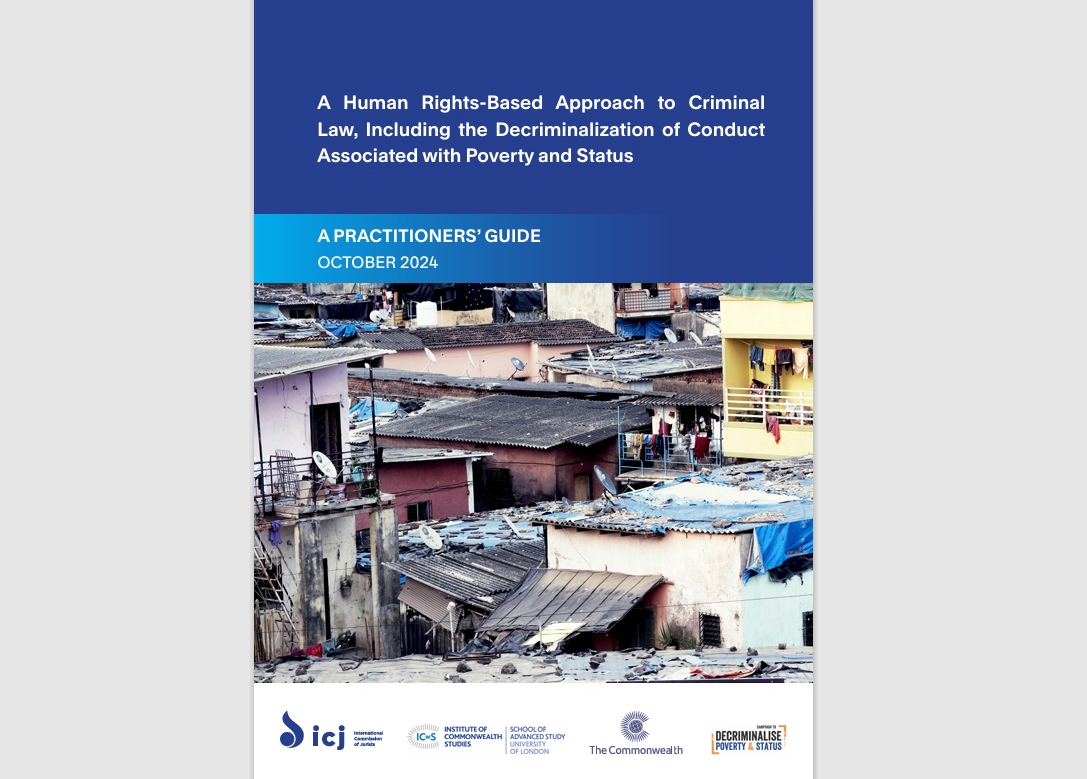
Two years ago, the Institute of Commonwealth Studies secured funding from the Open Society Foundations to run a pilot project on the Commonwealth and decriminalization of poverty and status. As Louise Ehlers (Open Society Foundations) has long argued, around the world states routinely use law enforcement, courts and prisons against the poor and most marginalized for reasons that have little to do with safety. Instead, these laws & systems are aimed at protecting wealth and privilege. Criminal justice institutions, with the mandate to arbitrate on and dispense justice, hold the power to curtail fundamental human rights. They are among the most powerful tools available to states to assert social control and oppress dissent, backed by lethal force, extreme and disproportionate sentencing. The personal and social consequences are severe including overcrowding and inhumane conditions of detention. These amount to multiple, intersectional forms of oppression, combining discrimination on the basis of gender, mental health, race, ethnicity, nationality and class. The negative outcomes and knock on effects for marginalized constituencies are significant: these communities include the homeless, women, and landless and land-poor groups, people with disabilities, the LGBTIQ+ community, sex workers, informal traders, and individuals who otherwise use public spaces to earn a living.
Commonwealth countries, with their historically connected legal systems, provide many examples of this. Over the past year, Professor Kingsley Abbott, Director of the ICWS, expanded the initial project, in collaboration with the International Commission of Jurists and the Rule of Law Section at the Commonwealth Secretariat. The result of this hard work was presented at a side event at this week’s CHOGM: a practitioners tool kit for the judiciary, prepared in collaboration with the Rule of Law section at the Secretariat, together with a detailed assessment of case law across South Asia written by Daron Tan, ICWS Fellow and Legal Adviser at the International Commission of Jurists. There was an impressive line-up on the launch panel, including Justice Aruna Devi Narain, a member of the Supreme Court of Mauritius, Dr Liz Macharia (head of Rule of Law Division at the Secretariat), Dr Cherisse Francis, Senior Law Lecturer Queen Mary’s University and incoming ICWS Fellow, and Jeshua Bardoo, Director of the East Caribbean Alliance for Diversity and Equality (ECADE). (This launch paralleled another side event co-hosted by the ICWS and the Global Campaign to Decriminalize Poverty and Status designed to facilitate a civil-society focussed conversation around what a human-rights based approach to criminal law looks like, including decriminalization of freedom of expression.)
The arguments for the relevance of this work are cogent:
- it is designed to enhance the rule of law, to ensure this is equality focused and consistent with international human rights principles;
- processing those charged with petty offences over-burdens already stretched court systems, and contributes to overcrowding in prisons;
- it connects directly with the Plan of Action on Equal Access to Justice, agreed by heads in Kigali in 2022.
Too often, the Commonwealth is accused of being bound up in process and the rhetoric of declarations. Here is an outcome which – if backed by resources, and ongoing commitment from the judiciary and civil society – could make a substantial difference. It connects directly with recent soft law judgements in the African Court of Human and People’s rights. The 2017 ACHPR Principles on the Decriminalization of Petty Offences in Africa provided a blueprint for African States to guide the review of outdated and discriminatory criminal law. Building directly on this, in December 2020, the Campaign to Decriminalize Petty Offences in Africa secured an Advisory Opinion from Africa’s apex court which ruled that colonial-era Vagrancy laws violate the rights in the African Charter on Human and Peoples’ Rights to equality, dignity and freedom from cruel and inhuman treatment. This put a positive obligation on States to reform their criminal laws, and to stop unlawful arrest practices. The Advisory Opinion, read with the Principles, provide a singular opportunity for an urgent review of relevant legal and policy frameworks not only in Africa but also in other regions grappling with a similar colonial legacy, contributing to a broader global movement towards the dismantling of policies that perpetuate discrimination.
Is this going to be yet another detailed report and valuable Commonwealth practitioners’ guidelines that just sit on the Commonwealth Secretariat Library shelves, gathering dust? That depends on visibility and implementation. As all the speakers at today’s launch emphasised, it will need ongoing education and training of judges and magistrates to ensure that they remain up to date with international humanitarian law and standards. Daron Tan underlined that ensuring Commonwealth domestic legal systems conform to international humanitarian law is only part of the solution. Governments need to address the root causes of poverty and status, rather than relying on a punitive or custodial approach towards the vulnerable and most marginalize members of society. Changing wider social attitudes towards poverty and the disadvantaged is as necessary as changing legislation; resisting push back against a rights-based approach to domestic laws will also be a must. Furthermore, repealing laws that discriminate against poverty and status leaves a gap – and may lead to other legislation that performs the same function. Making sure that there is sustained change will need continuing input from all branches of the state, and that includes active input from civil society organisations.
The practitioner guidelines will be presented to the next Commonwealth Law Ministers’ meeting in Fiji in 2026, but that’s in over 12 months’ time. We look forward to hearing from the ICWS and the Secretariat about the next steps in the meantime.
Sue Onslow is a visiting professor at King’s College London and former Director at the Institute of Commonwealth Studies. Sue will become the editor of The Round Table: The Commonwealth Journal of International Affairs in 2025.



